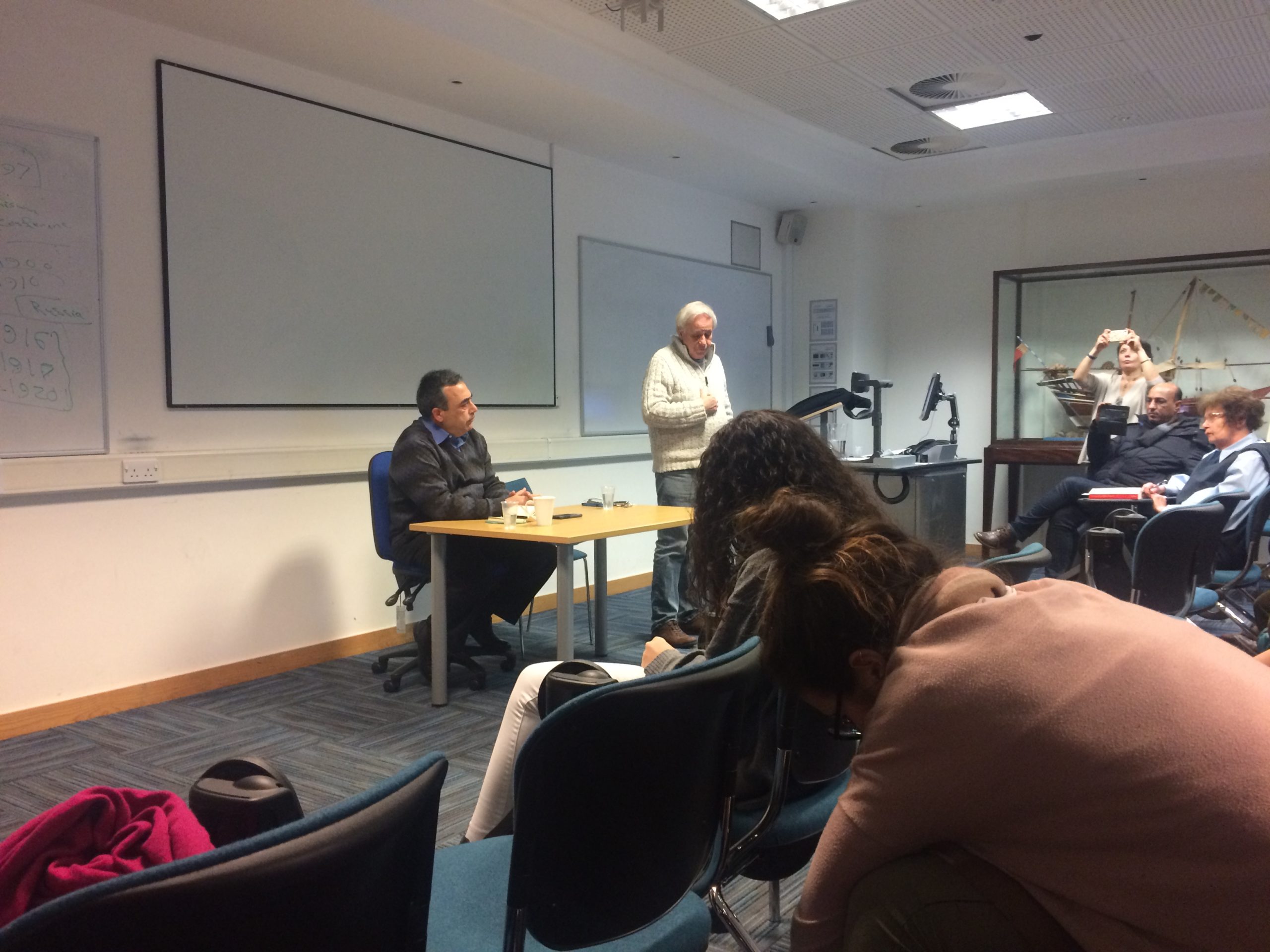
Dr As’ad Ghanem was warmly welcomed by Professor Ilan Pappé, who explained that he had taught Professor Ghanem many years ago, and that the two had collaborated on many projects since then. Before handing over to Professor Ghanem, Ilan Pappé acknowledged that the talk we were gathered to hear in the Institute of Arab and Islamic Studies was in competition with another ‘secret speaker’, the Ambassador of Israel to the UK, but Pappé explained that this must be a coincidence, as he does not believe in conspiracy theories.
Ilan Pappé is a professor here at the University of Exeter, and a fellow of the IAIS. He is renowned for his contributions to the work of the Israeli New Historians, who argue for a more critical interpretation of the creation of the Israeli state.
Professor Ghanem introduced himself as a member of the Follow Up committee. This committee brings together Palestinian-Israel citizens from local authorities, NGOs and even the Knesset, all with the aim of shedding light on the plight of Palestinian people living in Israel. The crucial question facing the committee, and the Palestinian community as a whole, is “where do we go from here?” Professor Ghanem attributes this dilemma to three major developments:
- This represents a big crisis for Palestinians. Palestinians living in Israel have found themselves cut off from Palestinians in the Occupied Territories, which has led to in-fighting between Fatah and Hamas.
- Collapse of the peace process in 2000. For Professor Ghanem, the possibility of a two-state solution has been exhausted, so we need to think of something else.
- Dominance of the right in Israeli politics. Professor Ghanem argues that the shift to the right in Israeli politics has been detrimental for Palestinians. He referred to the Israeli Minister of Justice, Ayelet Shaked, who recently said at a press conference, “There is place to maintain a Jewish majority even at the price of the violation of rights”.
So why this new focus on the status of Palestinians in Israel? This group has, thus far, been forgotten by the Palestinian nationalist movement. But Professor Ghanem argues that the Palestinian minority in Israel should not be ignored because it represents a ‘crucial test for Israeli democracy’.
For Professor Ghanem, the essential next step for Palestinian-Israeli citizens is to get organised. He noted that there has already been some progress in this direction. In 2006, Arab council leaders in Israel got together to release a document, The Future Vision of the Palestinian Arabs in Israel, which outlined a shared agenda for Palestinians, and according to Professor Ghanem, ‘shows our ability to say what we want’. In addition to this, Palestinian civil society is growing, and Arab parties are collaborating in the Knesset in a political alliance known as the Joint List. Although there is still a lot of internal conflict, Professor Ghanem is hopeful that the cooperation will continue.
What is the Follow Up committee up against? Professor Ghanem believes that at the core of the problems faced by the Palestinian minority, is the way Israeli Jews understand national security. For most democratic states, national security is about preserving sovereignty, internal order and perhaps even protecting the democratic nature of the state. But in Israel, Professor Ghanem asserts that national security extends to defending the Jewishness of the state.
The Follow Up committee claims that the determination of the Israeli government to protect the Jewishness of the state has led to the legalisation of discrimination against Palestinians. [Later in the talk, Ilan Pappé pointed out that Professor Ghanem is not legally allowed to live in the house he inherited from his grandfather due to one of these discriminatory laws]. The committee is determined to make the world aware of this legalised discrimination.
Professor Ghanem referred specifically to the Jewish Nation-State Bill which he argued closes the window on the claims of Palestinians as equal citizens. He also mentioned the Multi-cultural bill which was recently proposed by a member of the Joint List coalition, as an alternative to the Jewish Nation-State Bill. The alternative bill clearly emphasises the importance of equality, human rights, and equal distribution of resources between citizens of all ethnicities. However, Ghanem explained that many Israelis ‘reject in principle’ the idea of having equality in the Basic Law.
The Jewish Nation-State Bill
This bill is intended to declare that Israel is the nation-state of Jewish people, and map out what this means in terms of cultural symbols such as a national anthem and national holidays. However, critics have pointed out that the bill does not mention anything about democracy and some fear that this could leave minorities at risk.
The Jewish Nation-State Bill leaves Professor Ghanem fearful that Israel will act aggressively, and non-democratically against Palestinians. This is why the legalisation of discrimination is at the top of the Follow Up committee’s agenda. The goal is to make the international community aware of the legalised discrimination occurring in Israel, and mobilise international institutions to abolish these discriminatory laws.
In this talk, the message was clear. Professor Ghanem and the Follow Up committee are not launching an all-out assault on the Israeli government, and certainly not on the Israeli people [in response to a question from the audience, Ghanem emphasised that there is plenty of cooperation between Jews and Palestinians in Israel]. Instead, the committee is concerned with guaranteeing that democracy in Israel means democracy for all. And for this reason, they are determined to bring international attention to the laws that they believe to be discriminatory and have these laws abolished.



Average Rating